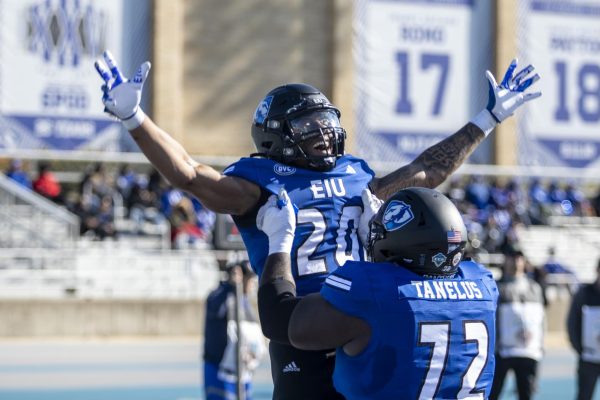Big schools thinking small
A new trend college football scheduling has occurred throughout the country over the past few seasons.
Georgia opened its 2006 season and its defense of its Southeastern Conference Championship by defeating I-AA Western Kentucky 48-12. After going 11-1 and winning a bowl game last season, TCU hosted I-AA California-Davis in week two. A preseason Top 10 ranking didn’t stop California from scheduling tiny Portland State in week three and the defending national champion Texas invited in-state Sam Houston State to Austin, Texas, in week four.
“I think that when teams need a home game, they scramble to find it,” said Bill Little, Texas’ Special Assistant to the Football Coach.
In fact, 74 I-A schools have at least one I-AA school on its 2006 schedule, 34 of them are 2005 bowl teams and six of the I-AA schools have already posted an upset victory.
Eastern has scheduled a I-A school every year since 1998 and has played schools from the power conferences such as Kansas State, Missouri and Illinois.
This year’s Panthers schedule has Illinois and a trip to play Hawaii. The Illini paid Eastern $250,000 for the effort and Hawaii is covering the travel costs for the matchup this Saturday.
“I think we understand that playing these money games is part of the deal but that doesn’t mean we don’t go into it not trying to win,” Eastern acting head coach Mark Hutson said.
The practice of I-A schools scheduling smaller I-AA teams is not a new system.
But a handful of programs have never gone that route.
UCLA has never in school history scheduled an I-AA opponent for obvious reasons.
“We’ve always been in a position to avoid that and with the climate of Pasadena, Calif. it’s not hard to schedule home-and-home games with I-A schools,” UCLA sports information director Marc Dellins said.
UCLA has Utah, Rice and Notre Dame as its non-conference games this season.
Some of the issues that have caused powerhouse programs to dip into the I-AA ranks are a 12th game that was recently instituted, the breaking of contracts, the constant changing of the Bowl Championship Series formula and conference scheduling changes.
A 12th GAME
In the summer of 2001, the NCAA announced it would add a 12th game to all college football schedules as a trial situation.
This temporary and sudden ruling allowed Eastern to schedule nationally ranked Kansas State and make $250,000 from the Wildcat program. At the same time, other I-A schools were forced to quickly make one-game deals with I-AA programs in order to fill its schedule.
Unlike basketball, contracts between schools for future football games are usually made at least two or three years into the future.
“I think some schools are trying to find the right mix of schools that fit their philosophy,” said Iowa sports information director Phil Haddy. “Many schools are in that boat where they don’t know what direction they want to go.”
In 2005, the NCAA was so satisfied with the effects of the 12th-game experiment that they made it official on a regular basis starting in 2006. Once again, football powerhouses were left with a game on the 2006 schedule that had to be filled.
“I think people thought that 12th game would create a Oklahoma-Alabama match up but that’s not what happened,” said TCU director of media relations Mark Cohen. “Coaches want wins, athletic directors want wins and that’s what makes those Texas-Ohio State games so rare.”
Most programs decided to fill that date with a I-AA program in order to guarantee a home game that they could make money on and ensure being one win closer to being bowl eligible.
“We felt like we have a great game-day atmosphere and venue so it was in our best interest to go that way,” said Georgia associate athletic director Arthur Johnson. “We couldn’t find a tougher team to play without making the return trip.”
Johnson is in charge of football scheduling for the Bulldogs program.
The Panthers benefited from the 12th game because it allowed Eastern director of athletics Rich McDuffie to negotiate another I-A game into its 2006 schedule.
An NCAA rule allows a team that schedules Hawaii to schedule an extra game. The purpose is because of travel seeing as how the school must leave the mainland United States.
“It’s the NCAA’s way of trying to help Hawaii and Alaska schools in terms of scheduling games,” Hawaii’s Athletic Director Herman Frazier said when it was announced.
The close relationship between McDuffie and Frazier, led to the two schools coming to the agreement. When it was announced, McDuffie said the deal came about in a matter of a day or two.
“It was pretty much a handshake deal that materialized in the span of 24 hours,” Frazier said.
Portland State, a I-AA football program out of the Big Sky Conference, managed to schedule three I-A games in 2006 (New Mexico, California and Oregon), receive $1 million in contracts and got an opening-week 17-6 win over New Mexico.
With the win, PSU is finding it harder to schedule that I-A money game in the future.
“That game with (New Mexico) was signed before I got there but it’s a way for us to pay the bills and that’s a fact of life,” Portland State athletic director Teri Mariani said. “It’s a nice problem to have.”
Portland State is currently pursuing games against Kansas, Wisconsin or Auburn for 2007. Each school has awarded at least $600,000 for a single game appearance fee this season.
New Hampshire, Southern Illinois, Richmond and Montana State all beat I-A schools from BCS-related conferences (Northwestern, Indiana, Duke, Colorado).
Since all the schools are aware of a full schedule being 12 games from now on, their may be more consistency in the schedule-making over the next couple of years.
“Now that (the 12th game) is a way of life, we can plan ahead into future schedules,” LSU sports information director Michael Bonnette said. “We won’t want to make the I-AA thing an annual thing but once in a while, yes.”
(Lack of) consistency in BCS
The Bowl Championship Series was created in 1997 to consistently match the top two teams annually to play for the national championship.
The formula for the rankings has changed nearly every year in the hopes of eliminating controversy in the selection for the title game.
Playing a I-AA opponent will lower a school’s strength of schedule ranking but that element has decreased importance since the 2005 revisions.
“Some years it will affect the BCS and now it doesn’t whatever,” Little said. “It’s always confusing to tell whether it counted or not and how much.”
For a number of reasons, the overall national opinion is that getting the win is more important that the specific opponent and where the game was played.
“To be honest, playing a I-AA isn’t going to hurt you,” Cohen said. “If we win out, we’ll be there competing for a BCS-bowl in the end.”
The schools from the larger conference can rely on their league schedule for solid opponents and not have to worry about who they beat early in the year.
“We are always confident that the rigorous SEC schedule we play will balance out whoever we play outside the league,” Bonnette said.
In some instances, the conference dates will limit the options of the bigger schools.
“Matching up schedules is like trying to find that needle in a haystack,” Haddy said. “It does limit your number of possibilities.”
For example, the Pacific Ten Conference mandated in 2006 that all of teams would play each other making it a nine-game league schedule and limiting its non-conference games from the normal four to three.
“The Pac Ten football schedule has created several problems,” said Arizona sports information director Richard Page. “I don’t know why they did this but that’s why you see Oregon playing a conference game in Stanford on the opening week.”
Truth. Lies and Scheduling
Every off-season a number of schools break legal contracts with other institutions and until recently didn’t have to pay financial compensation.
“I get a lot of calls at Portland State from I-A schools when somebody cancels on them,” Mariani said.
The only reason Eastern got its first game with Hawaii in 2002 was Arizona declined its previously agreed upon contract. The Wildcats administration cited financial concerns over a low number of alumni wanting to make the trip to Hawaii in early September.
“It’s hard to get people excited about going to Hawaii in September when they can just stay in Tucson,” Page said.
The University of Illinois broke a home-home contract with Oregon after scheduling them in the mid 1990s for later in the decade but once the Ducks became a national power, the Illini pulled out playing them on the road in a hostile environment known as the Autzen Zoo.
Georgia’s athletic department confirmed they had a “major I-A school” back out of a contract for it’s season opening Sept. 2 date but would not comment on which school.
“This is honestly a relationship business and a unfortunate part but it’s something we can’t control,” Johnson said. “We have bigger buyouts to make it tougher but if a school gets a coaching change, they probably need an easier schedule.”
The contract breaking even occurs at the I-AA level.
“We had a game secured and locked up with Grambling State and they pulled out in early March,” said Mark Cohen, TCU media relations director.
The Horned Frogs were lucky enough to fill that date with I-AA California-Davis.
Southern Illinois had played Ohio Valley Conference foe Southeast Missouri annually since 1993 but the Redhawks hired new head coach Tony Samuel and canceled its 2006 game that was supposed to be in Carbondale.
The Salukis were forced to schedule Division II Lockhaven.
“(SEMO) just decided they didn’t want to play us anymore,” SIU director of media relations Tom Weber said. “We’d actually like to play a rivalry with Eastern every year to make up for that open date but gotten no response back.”












































